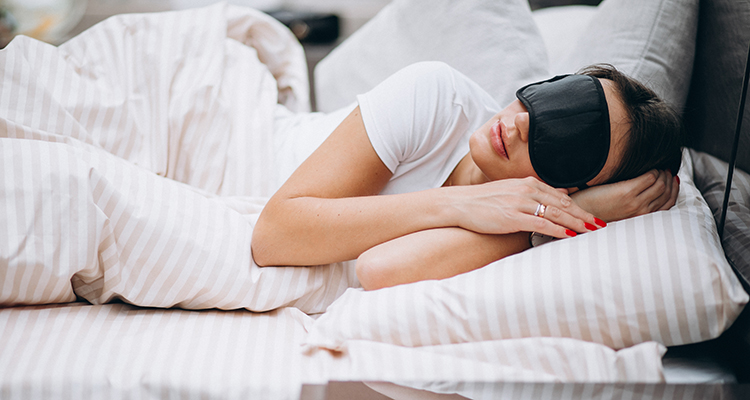What is Paradoxical Sleep and Why It Matters?
Paradoxical is a term that holds many meanings in the sleep study world. In fact, it’s used to describe four very unique sleep conditions: paradoxical sleep, paradoxical sleep deprivation, paradoxical insomnia, and paradoxical intention. This overlap of definitions can sometimes make it difficult to get a grasp on exactly what paradoxical sleep is, but we’re here to clear the air!

In its most basic form, paradoxical sleep describes the REM (rapid eye movement) cycle of sleep. During this stage, your brain undergoes intense activity, which is one reason paradoxical sleep is also referred to as dreaming sleep. Your body, on the other hand, completely relaxes at this point. Your heart rate and breathing slow down and some people enter a state of partial paralysis. It’s this paradox of your brain being active and using lots of energy while your body is completely inactive that gives this type of sleep its name.
Keep reading to discover even more information on paradoxical sleep in all its forms, including what paradoxical insomnia is and tips for insomnia treatment at home.
Content
Understanding Paradoxical Sleep
Paradoxical sleep occurs during the third stage of sleep, also known as the REM cycle. While your REM cycle is the most restorative sleep stage, it encompasses the smallest portion of your entire night’s sleep — only about 25%. REM sleep is essential for organizing, sorting, and forming memories. It also promotes healthy cognitive function and emotional processing. Some studies show that REM sleep increases your chances of learning and developing new skills.

As the name — rapid eye movement — suggests, the only muscles that are engaged during the REM cycle are your eyes and diaphragm. This semi-paralysis prevents you from acting out or moving violently during vivid dreams. During paradoxical sleep, your brain is extremely active but your body is not, creating a paradox.
Paradoxical Sleep Deprivation
Paradoxical sleep deprivation occurs when your brain and body don’t spend enough time in the REM, or paradoxical, sleep stage. Those with paradoxical sleep deprivation have no trouble falling asleep but remain in a state of light sleep all night. They rarely, if ever, enter the REM cycle which is needed for deep sleep and restoration.

Those who suffer from paradoxical sleep deprivation are at greater risk of developing physical health complications. Without adequate REM sleep, your body can’t expel dangerous toxins, repair muscles, or strengthen cognitive function including learning and memory. An overnight sleep study can usually determine if you suffer from paradoxical sleep deprivation.
Other warning signs and symptoms include
- Weight gain/increased appetite
- Mood swings due to a hormone imbalance
- Excess fatigue
- Difficulty with memory and concentration
- Impaired immune system
- Inability to regulate body temperature
- Anxiety/depression
Once diagnosed, there are several treatment options available including relaxation, sleep restriction, and stimulus control therapies, as well as prescription medication. Lifestyle changes and improved sleep hygiene can also help combat paradoxical sleep deprivation.
Paradoxical Insomnia
Slightly different from paradoxical sleep deprivation, paradoxical insomnia is a rare sleep condition where individuals feel like they’re not sleeping but don’t show any physical symptoms of sleep deprivation. Paradoxical insomnia is also referred to as sleep state misrepresentation.

People with this condition misjudge how long it takes them to fall asleep, how frequently they wake up, and how long they’ve actually slept. During sleep, paradoxical insomnia sufferers are on high alert and extremely aware of their surroundings. Research suggests that these individuals alternate between stage one of sleep (light sleep) and wakefulness, without ever entering deep sleep, or stage three.
Paradoxical insomnia can be difficult to diagnose based on symptoms alone because to those around you, you appear to be getting a good night’s sleep. In addition, not all sleep studies or tests will correctly diagnose this rare form of insomnia. Because of this, many paradoxical insomnia patients experience anxiety or depression, low self-esteem, impaired personal relationships, and are at higher risk for addiction.
An experienced sleep specialist can help determine and diagnose your insomnia based on your symptoms and sleep history. They may suggest treatments including CBT-i (cognitive-behavioral therapy for insomnia), meditation, and improved sleep hygiene.
Paradoxical Sleep Intention
As a form of CBT treatment, paradoxical intention may appear counterintuitive but has proven quite effective for treating certain cases of paradoxical insomnia. Remember, a paradox, by definition, is a logically self-contradictory statement that is contrary to your expectations.

In terms of paradoxical insomnia, you’d expect your body to be active and moving during REM sleep since your brain is so active but instead, your body is virtually paralyzed. Applying this concept to treating insomnia means that by doing the opposite of the intended outcome, you will, in fact, achieve the desired results. Instead of lying in bed trying to fall asleep, paradoxical intention encourages you to lay in bed and try to stay awake.
Staying awake longer and later at night can help you feel more tired and prepared for sleep come nightfall. In addition, taking the pressure off of yourself to fall asleep quickly will reduce the stress and anxiety you have over sleep, helping you relax. By tricking your brain into thinking you don’t have to fall asleep right away, that may, in fact, be exactly what happens. An example of paradoxical intention at work is trying to stay awake during a boring movie or lecture. The mere act of trying to stay awake and telling yourself that you can’t fall asleep only makes you more tired.
A therapist or online therapy program can help guide you through this CBT method by confronting your fear of staying awake all night and identifying the potential negative effects. The goal is to reduce feelings of pressure and anxiety associated with falling asleep. In time, being quiet and awake but relaxed becomes a welcomed alternative to anxiously tossing and turning. You may also learn distraction techniques including breathing exercises, guided imagery, and progressive muscle relaxation.
Other techniques include staying awake and out of the bedroom until you feel tired enough for sleep. Once you enter your bedroom, keep the lights low and all screens and digital devices turned low. Lay quietly with your eyes closed and implement some of the strategies mentioned above. Most paradoxical insomnia sufferers find they fall asleep much faster in this type of environment. This is an especially helpful approach for those who struggle to fall asleep, rather than for those who fall asleep quickly but wake frequently during the night.
Understanding Paradoxical Sleep In All Forms
As you can see, paradoxical is used to describe everything from a type of sleep to sleep disturbances and even insomnia treatment. Understanding this phenomenon in all forms can help you finally achieve the deep sleep you so desperately need and deserve.

Somnus Therapy is dedicated to helping you identify and accept your sleep troubles while finding the best form of treatment for your unique needs. We use a mix of CBT for insomnia, Acceptance and Commitment Therapy for Insomnia (ACT-i), mindfulness, and other therapy methods for a multi-faceted approach and long-term results.













